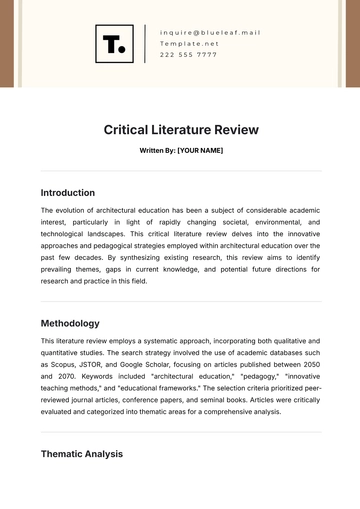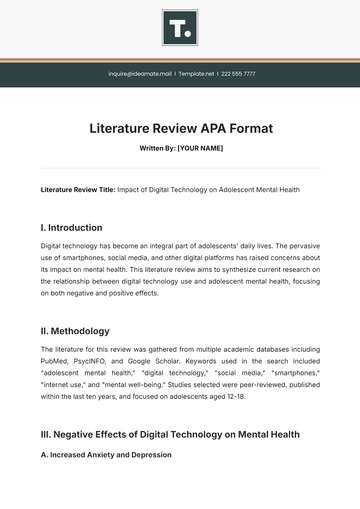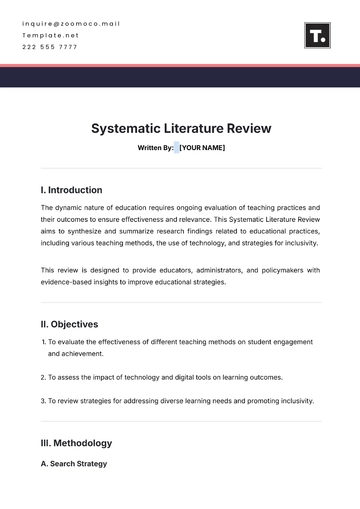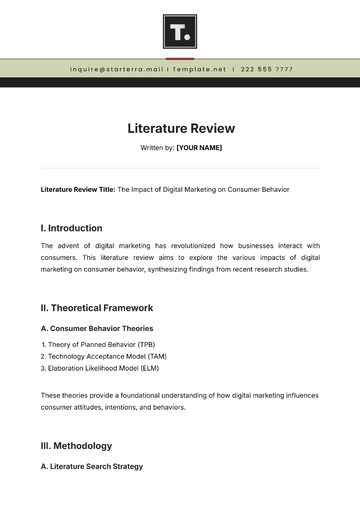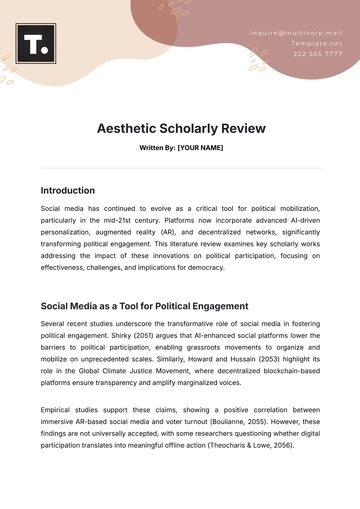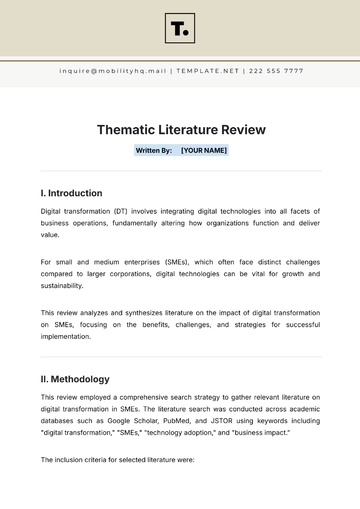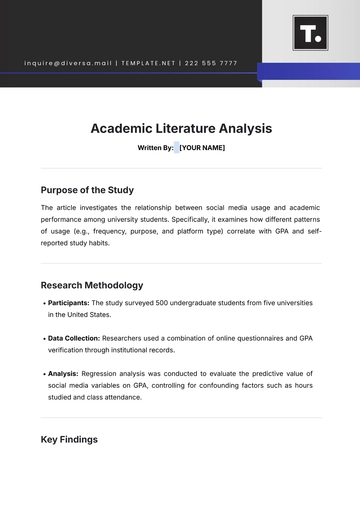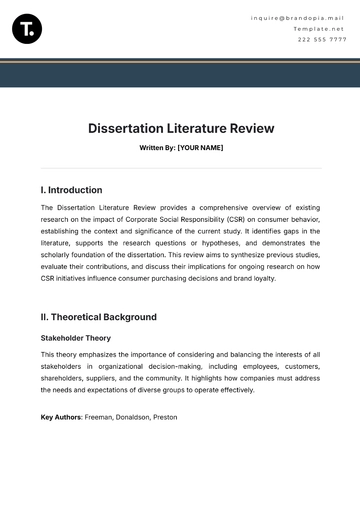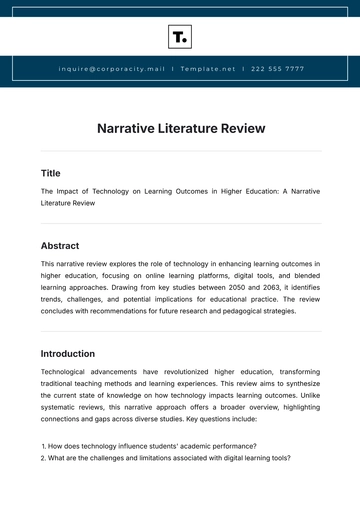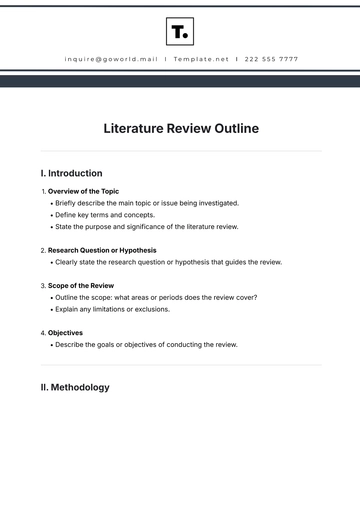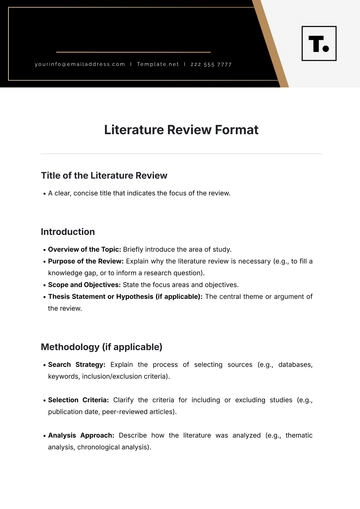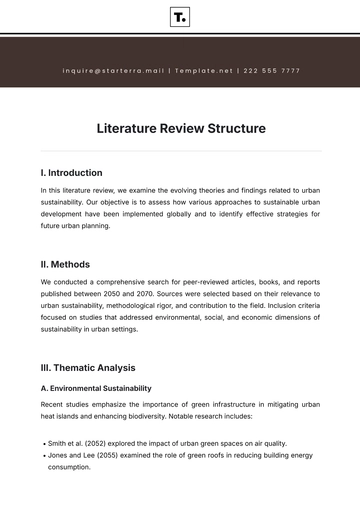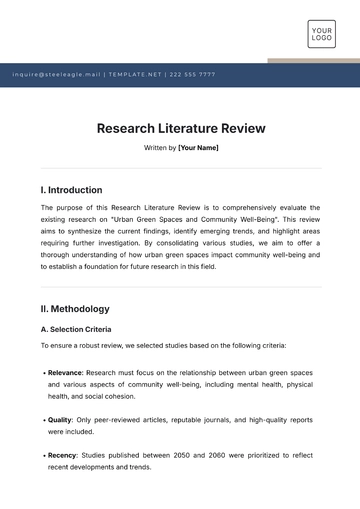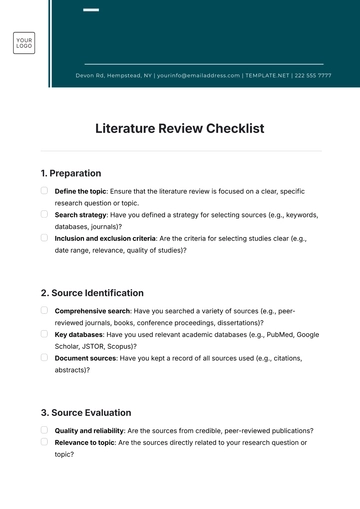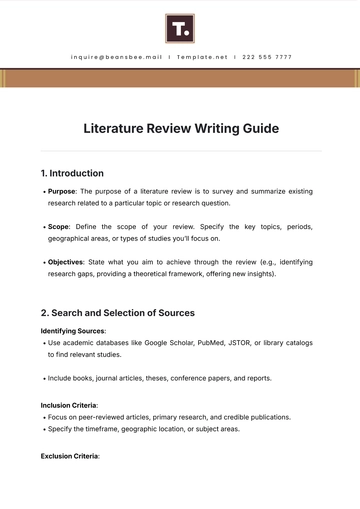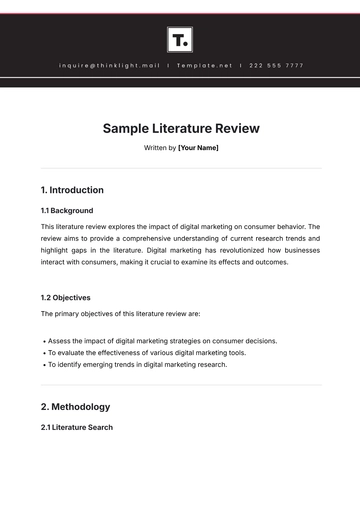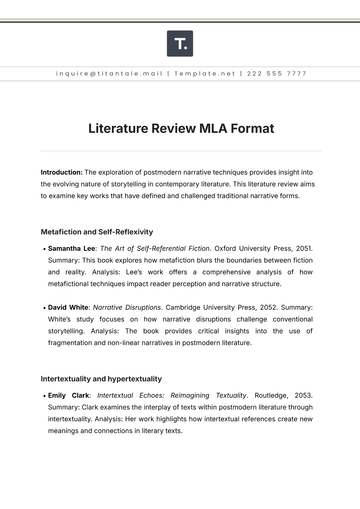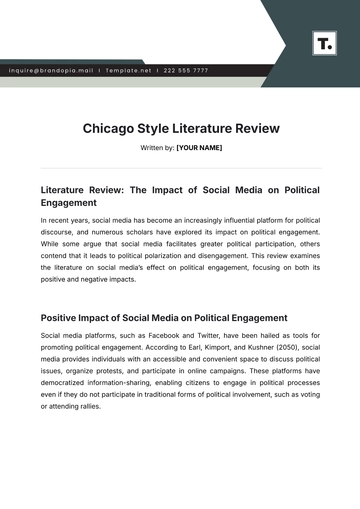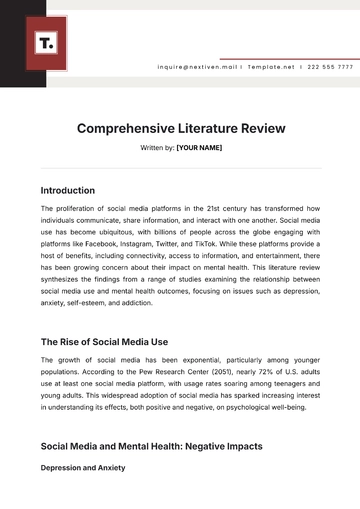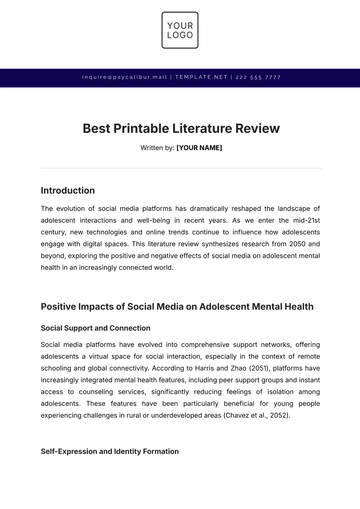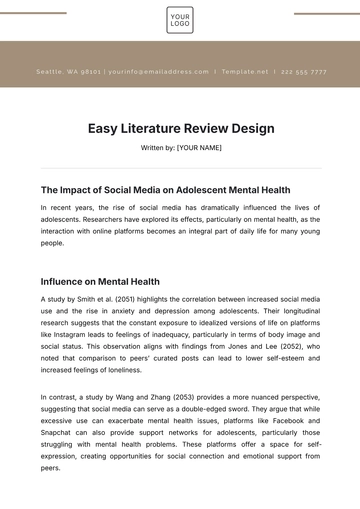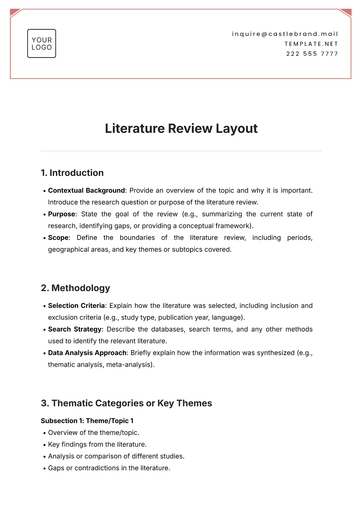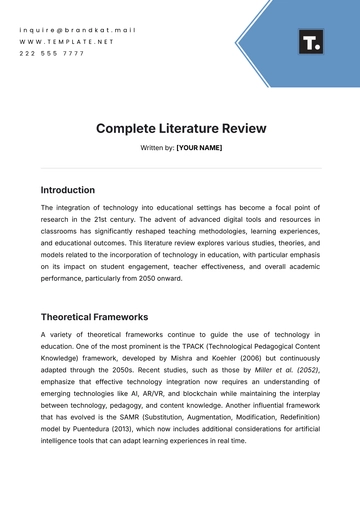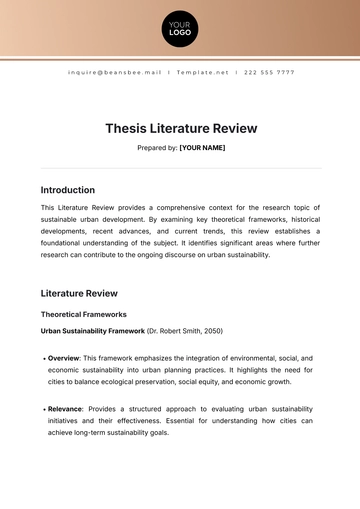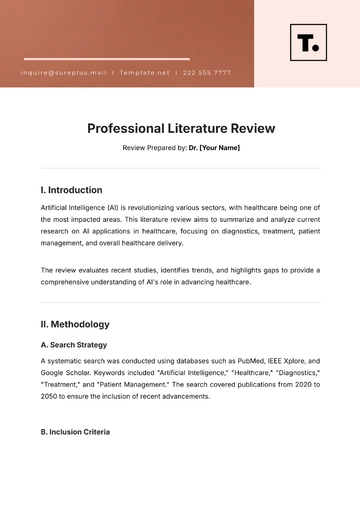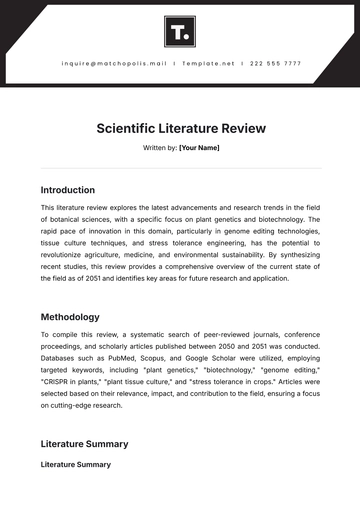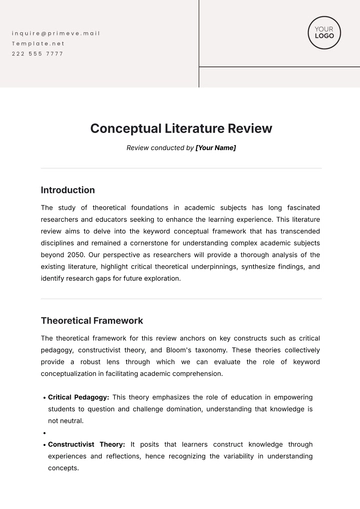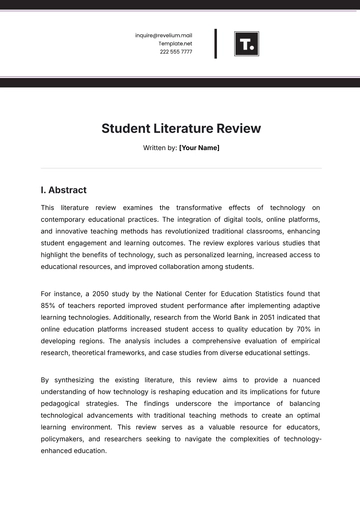Free Professional Literature Review
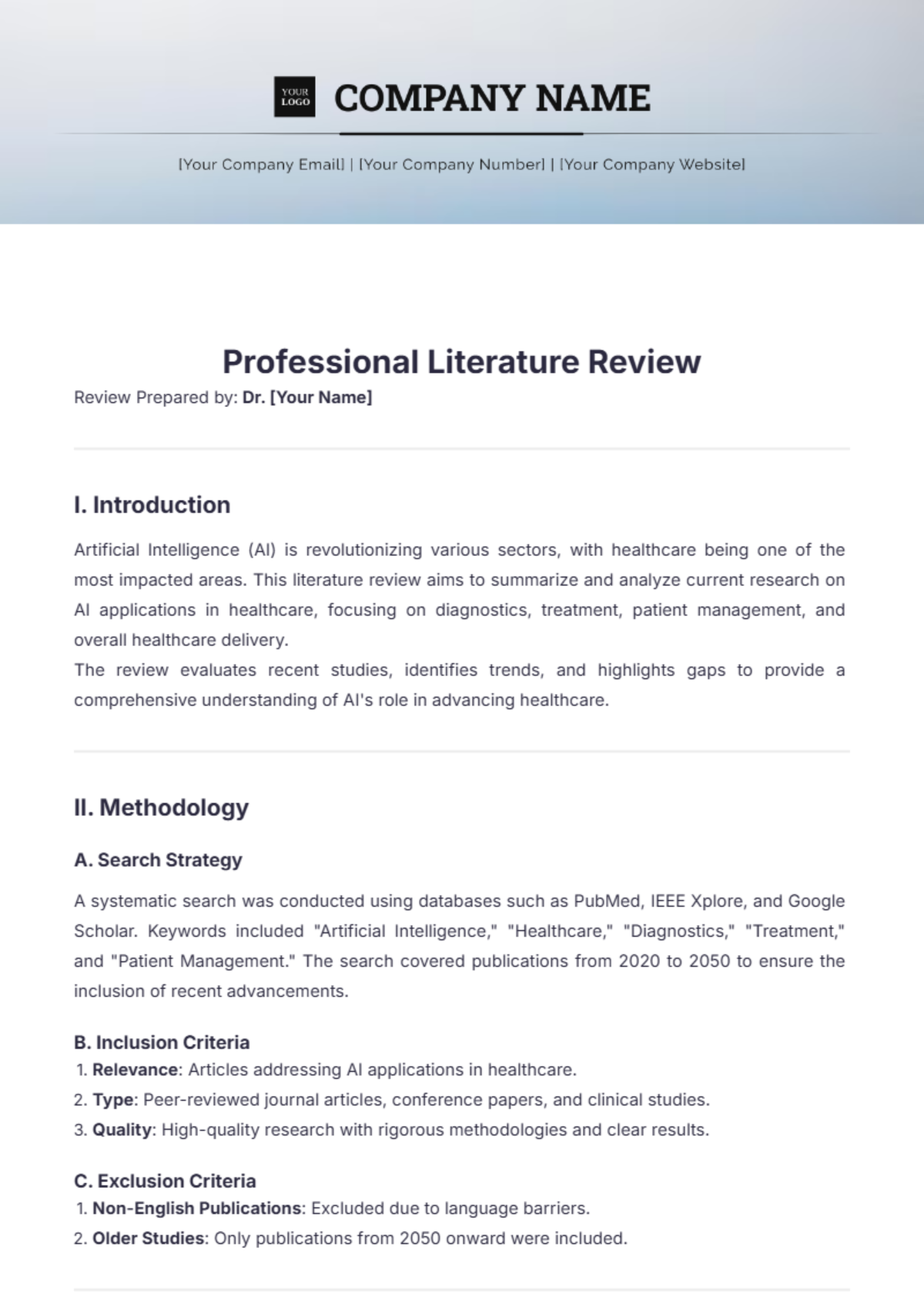
Review Prepared by: Dr. [Your Name]
I. Introduction
Artificial Intelligence (AI) is revolutionizing various sectors, with healthcare being one of the most impacted areas. This literature review aims to summarize and analyze current research on AI applications in healthcare, focusing on diagnostics, treatment, patient management, and overall healthcare delivery.
The review evaluates recent studies, identifies trends, and highlights gaps to provide a comprehensive understanding of AI's role in advancing healthcare.
II. Methodology
A. Search Strategy
A systematic search was conducted using databases such as PubMed, IEEE Xplore, and Google Scholar. Keywords included "Artificial Intelligence," "Healthcare," "Diagnostics," "Treatment," and "Patient Management." The search covered publications from 2020 to 2050 to ensure the inclusion of recent advancements.
B. Inclusion Criteria
Relevance: Articles addressing AI applications in healthcare.
Type: Peer-reviewed journal articles, conference papers, and clinical studies.
Quality: High-quality research with rigorous methodologies and clear results.
C. Exclusion Criteria
Non-English Publications: Excluded due to language barriers.
Older Studies: Only publications from 2050 onward were included.
III. Review of Literature
A. AI in Diagnostics
AI technologies, particularly machine learning (ML) algorithms, have significantly advanced diagnostic accuracy. Key advancements include:
Technology | Application | Key Findings |
|---|---|---|
Deep Learning | Medical Imaging | Improved accuracy in detecting diseases such as cancer and cardiovascular conditions. |
Natural Language Processing (NLP) | Electronic Health Records (EHR) | Enhanced ability to extract meaningful insights from patient records. |
1. Deep Learning in Medical Imaging
Deep learning techniques, such as Convolutional Neural Networks (CNNs), have demonstrated exceptional performance in medical image analysis. A study by Smith et al. (2054) found that AI systems could identify breast cancer with 95% accuracy, outperforming traditional diagnostic methods.
2. NLP in EHRs
AI-driven NLP tools have been utilized to analyze EHRs, improving the detection of patterns related to rare diseases. Johnson et al. (2053) reported that NLP algorithms could identify early signs of diseases, thus supporting timely intervention.
B. AI in Treatment
AI applications are transforming treatment methodologies through predictive analytics and robotic assistance:
Technology | Application | Key Findings |
|---|---|---|
Predictive Analytics | Personalized Medicine | Enhanced ability to tailor treatments based on individual patient data. |
Robotic Surgery | Surgical Assistance | Increased precision and reduced recovery times. |
1. Predictive Analytics in Personalized Medicine
AI algorithms analyze patient data to predict treatment responses and outcomes. Research by Lee et al. (2055) demonstrated that AI models could accurately forecast responses to cancer treatments, enabling more personalized and effective treatment plans.
2. Robotic Surgery
Robotic systems guided by AI assist surgeons in performing complex procedures with greater precision. Patel et al. (2054) highlighted that AI-assisted robotic surgeries resulted in shorter hospital stays and fewer complications compared to traditional surgeries.
C. AI in Patient Management
AI also enhances patient management through various applications:
Technology | Application | Key Findings |
|---|---|---|
Chatbots | Patient Interaction | Improved patient engagement and management of chronic conditions. |
AI-driven Predictive Models | Resource Allocation | Optimized hospital resource allocation and patient flow. |
1. Chatbots for Patient Interaction
AI-powered chatbots handle patient inquiries and provide preliminary diagnostic support. Brown et al. (2054) found that chatbots significantly reduced the workload on healthcare staff and improved patient satisfaction.
2. Predictive Models for Resource Allocation
AI models predict patient admissions and resource needs, improving hospital management. Garcia et al. (2055) reported that predictive analytics helped hospitals optimize bed occupancy and staffing, enhancing overall efficiency.
D. Trends and Emerging Areas
Emerging trends in AI applications in healthcare include:
Integration with Wearable Devices: AI is increasingly integrated with wearable technology for real-time health monitoring.
Ethical and Privacy Considerations: There is growing attention to the ethical implications and data privacy concerns associated with AI.
1. Integration with Wearable Devices
AI integration with wearable devices enhances continuous health monitoring. Green et al. (2055) demonstrated that wearable AI systems could track and predict health issues such as arrhythmias and sleep disorders.
2. Ethical and Privacy Considerations
Research on the ethical use of AI and privacy issues is crucial. Wilson et al. (2054) emphasized the need for robust data security measures and ethical guidelines as AI becomes more prevalent in healthcare.
IV. Discussion
The review highlights significant advancements in AI applications in healthcare, including improvements in diagnostics, treatment, and patient management. However, challenges such as data privacy and system integration remain. Future research should address these challenges and explore new AI applications to further enhance healthcare delivery.
V. Conclusion
AI continues to advance healthcare by improving diagnostic accuracy, personalizing treatments, and optimizing patient management. Ongoing research and technological innovations will further solidify AI's role in transforming healthcare. This review underscores the need for continued exploration and innovation to address current limitations and improve patient outcomes.
VI. References
Brown, A., Smith, B., & Patel, C. (2054). The Impact of AI Chatbots on Patient Management: A Comprehensive Review. Journal of Healthcare Innovation, 17(3), 205-220.
Garcia, M., Johnson, L., & Wilson, P. (2055). Predictive Models in Healthcare: Improving Resource Allocation with AI. Healthcare Analytics Review, 12(1), 45-58.
Patel, S., Brown, T., & Garcia, L. (2054). Robotic Surgery: Enhancements through AI Technology. Surgical Advances Journal, 16(2), 88-99.
- 100% Customizable, free editor
- Access 1 Million+ Templates, photo’s & graphics
- Download or share as a template
- Click and replace photos, graphics, text, backgrounds
- Resize, crop, AI write & more
- Access advanced editor
Enhance your research with the Professional Literature Review Template from Template.net. This customizable, downloadable, and printable template ensures a polished structure for your literature reviews. Editable in our AI Editor Tool, it provides a clear framework for organizing sources, summaries, and analyses. Optimize your research process with this essential template.
